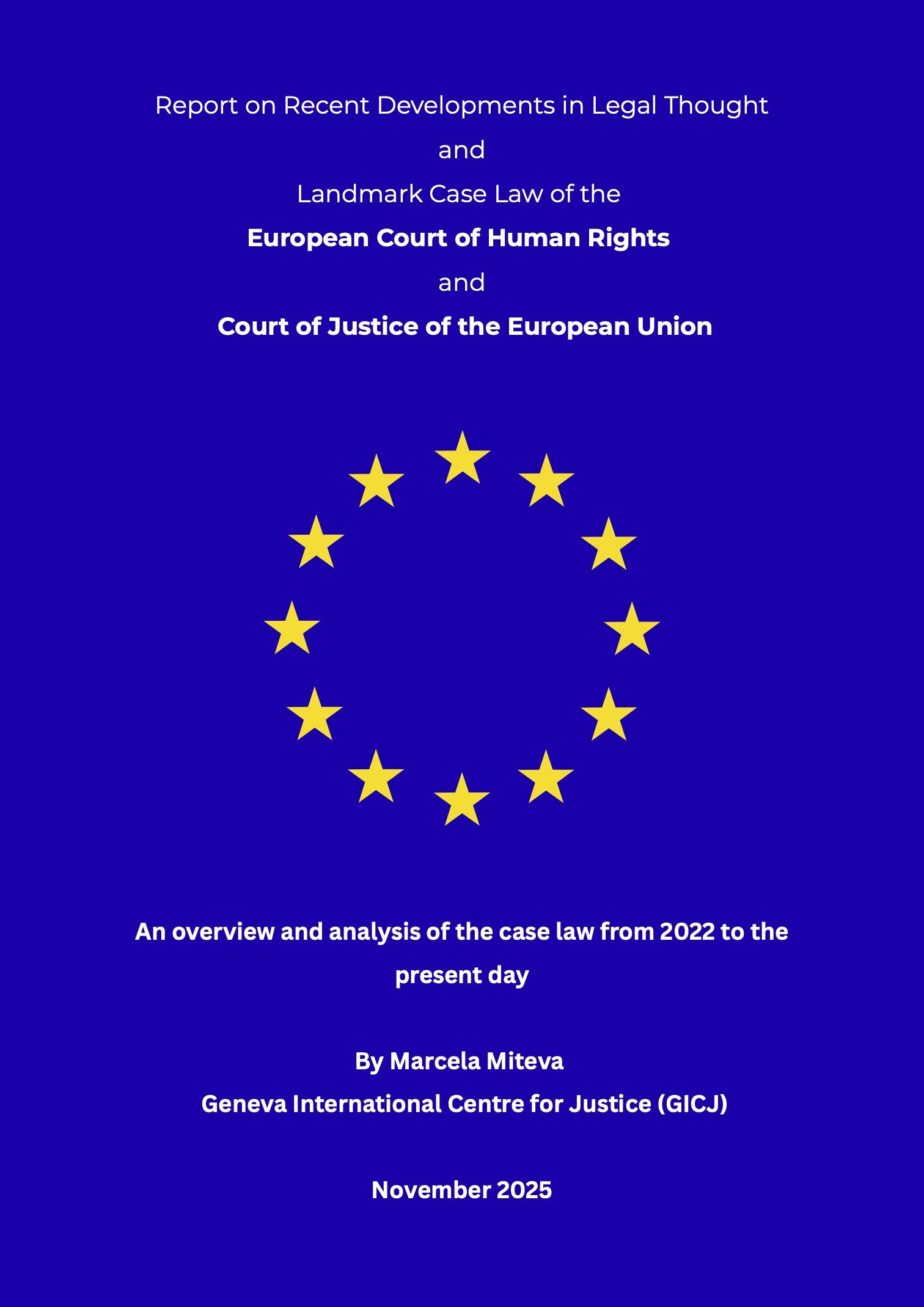The 52nd Session of the Human Rights Council
February 27th – April 4th, 2023
Agenda Item 9 – Interactive Dialogue with the Independent Expert on the human rights situation in Mali
March 31st, 2023
By Jamel Nampijja / GICJ
Executive Summary
On the31st of March 2023, the Independent Expert on the situation of human rights in Mali, Mr Alioune Tine, presented his report (A/HRC/52/81) during the interactive dialogue at the 51st Meeting of the 52nd Regular Session of the Human Rights Council (resolution 49/34). The report covered the period from April 1st to November 30th 2022. The report was compiled from data gathered during the Independent Expert's visit to Mali, which took place from August 1st to August 12th, 2022.
During his visit, Mr. Tine met with officials of the Government of Mali who facilitated his stay in the country and provided him with national and local officials’ access. He also met with the Minister of Justice and Human Rights, the Minister of National Reconciliation, Peace and National Cohesion, the President of the National Human Rights Commission (CNDH), and judicial authorities. Additionally, the Independent Expert met with representatives of civil society organisations, non-governmental organisations, political parties, the diplomatic corps, and United Nations agencies.
This was Mr Tine’s fifth report and it highlighted the ongoing concerns about the human rights situation in Mali, particularly the security crisis, and its impact on the lives of civilians as well as the shrinking civic space and freedom of expression. It called for Mali to fulfil its international human rights obligations, investigate and punish perpetrators of violations, and ensure accountability and reparations for victims.
Geneva International Centre for Justice (GICJ) welcomes the report of the Independent Expert. We commend the efforts undertaken by the government, especially the cooperation with regional and international mechanisms. GICJ calls upon the international community to continue providing the technical assistance required by Mali to ensure stability, promote respect for human rights, and effectively fight against impunity.
Background
The Independent Expert on the human rights situation in Mali is a position established by the United Nations Human Rights Council in 2013 through Human Rights Council resolution 22/18. The resolution mandates the Independent Expert to collaborate with various entities, including the United Nations, the African Union, ECOWAS, the Group of Five for the Sahel, neighbouring states, other relevant international organisations, and civil society in Mali, within the framework of the mandate. The resolution also requires the Independent Expert to submit a report to the Human Rights Council.
The human rights situation in Mali has been complex and challenging since 2012, marked by political instability, armed conflict, and terrorism. Mali has faced internal conflicts, including separatist movements, attacks by various armed groups, and terrorist groups such as Al-Qaeda in the Islamic Maghreb (AQIM), Ansar Dine, and the Islamic State in the Greater Sahara (ISGS). These conflicts have resulted in widespread human rights violations, including killings, sexual and gender-based violence, displacement of populations, and attacks on civilians, particularly women and children.
The mandate of the Independent Expert on the human rights situation in Mali is to monitor and report on these human rights violations and make recommendations to the Malian government and the international community on addressing these issues and promoting respect for human rights in the country. The Independent Expert may also work with other UN bodies, international organisations, and civil society organisations to gather information and investigate human rights abuses in Mali.
Mr. Alioune Tine assumed the position of Independent Expert on May 1st, 2018. On June 22nd, 2020, the mandate of the Independent Expert was renewed by the Human Rights Council (Resolution 43/38) for one year. This renewal enables the Independent Expert to assess the human rights situation in Mali, provide support to the government in promoting and protecting human rights, and strengthen the rule of law while implementing recommendations from Council resolutions. Mr. Tine is a founding member and serves as the President of the African Meeting for the Defense of Human Rights (RADDHO) and as the Coordinator of the Forum of African NGOs at the World Conference against Racism in 2000.
Report of the Independent Expert on the Situation of Human Rights in Mali
Mr. Alioune Tine, the Independent Expert on the situation of human rights in Mali, expressed satisfaction with the high-quality cooperation received from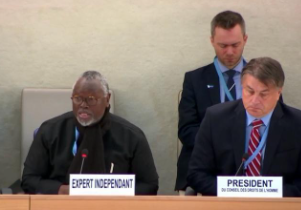 the government and welcomed the presence of two Malian Ministers, reflecting Mali's commitment to promoting and protecting human rights.
the government and welcomed the presence of two Malian Ministers, reflecting Mali's commitment to promoting and protecting human rights.
The report focused on the security crisis and its impact on civilian populations, the shrinking space for civil society and respect for the rule of law. Despite notable efforts by the Malian authorities, the security situation remained concerning, with attacks against civilians, the United Nations Mission in Mali, and the Malian defence and security forces by violent extremist groups. The number of internally displaced persons continued to rise, and education was deteriorating due to school closures for security reasons.
There was progress in setting laws for reparations for human rights violations, and a draft text to create a National Human Rights Directorate was adopted. Mr. Tine urged Mali's partners and the international community to support these initiatives. He raised concern about the impact of the crisis on civilians, including a 49% increase in gender-based violence during the reporting period.
The Independent Expert expressed deep concern about the shrinking space for civil society and respect for the rule of law, with virtually no freedom of the press or self-expression, and attacks on human rights defenders, including the Independent Expert himself on social media during his visit. The stifling of human rights defenders' work by the Malian State referring to them as foreign agents, was also noted.
With the country engaging in an electoral process, the Independent Expert called for wide-ranging debate and thought, urging the authorities to ensure human rights and freedoms of expression, press, and association, including for the opposition. Elections should be a moment of blossoming freedom. Mr. Tine urged the authorities and the international community to rethink their strategies and prioritise integrated approaches to ensure citizen safety, development, and the respect and protection of human rights.
Urgent recommendations were included in the report to address the security crisis in Mali and its impact on civilians. These include the need for continued support from the Security Council and regional bodies such as ECOWAS and increased efforts to combat impunity and hold perpetrators accountable for human rights violations and abuses. The report also called for strengthened cross-border security cooperation and efforts to address the root causes of the crisis, including political and geostrategic polarisation. The report emphasised the importance of upholding international human rights law and international humanitarian law in addressing the security crisis in Mali.
Statement by the Country Concerned
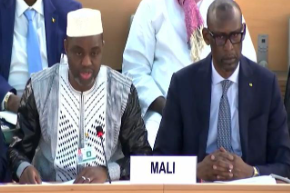 The Minister of Justice and Human Rights of Mali, Mamadou Kassogue, expressed Mali's disappointment with the overall approach of the report, stating that it failed to acknowledge the significant efforts and progress made in the areas of security and human rights promotion and protection. The Malian authorities had taken several measures to combat impunity as part of their zero-tolerance policy against abuses. The government regretted that the report insinuated a lack of political will or inability to prosecute on the part of the State. The transitional authorities were determined to end impunity, as demonstrated by holding special trial sessions in 2021, 2022, and 2023 for cases of serious human rights violations.
The Minister of Justice and Human Rights of Mali, Mamadou Kassogue, expressed Mali's disappointment with the overall approach of the report, stating that it failed to acknowledge the significant efforts and progress made in the areas of security and human rights promotion and protection. The Malian authorities had taken several measures to combat impunity as part of their zero-tolerance policy against abuses. The government regretted that the report insinuated a lack of political will or inability to prosecute on the part of the State. The transitional authorities were determined to end impunity, as demonstrated by holding special trial sessions in 2021, 2022, and 2023 for cases of serious human rights violations.
Furthermore, the government had taken energetic measures to fight against descent-based slavery, including the availability of a specific draft law against slavery and holding a special session of the Court of Assizes in Kayes in March 2023, which resulted in the trial of nearly 100 individuals. The government was unwavering in prosecuting and punishing proven perpetrators of human rights violations but faced objective constraints. Mr. Kassogue described The Malian army as republican, professional, multi-ethnic, and aware of its primary responsibility to protect all Malian populations.
He further stated that there were no restrictions on civil space in Mali, and civil liberties were regulated by law. The National Human Rights Commission carefully monitored the respect for the rights of Malian citizens. The government had adopted Inclusive and transparent timetables for political and electoral reforms with the involvement of all active forces in the country and partner organisations such as the Economic Community of West African States, the African Union, and the United Nations. The electoral law and new Constitution were drafted through participatory processes involving political parties and civil society organisations.
Regarding the Agreement for Peace and Reconciliation in Mali resulting from the Algiers process, the government remained committed to its diligent implementation despite current difficulties. A national reparation policy had been approved within the transitional justice framework. A 2021-2025 action plan established general rules for reparation of damages caused by severe human rights violations and created a dedicated agency for reparation. The fight against gender-based violence was also a priority for the government, with efforts made to improve legal and judicial responses. Mali reiterated its firm commitment to cooperate with all human rights mechanisms while opposing the politicisation and instrumentalisation of human rights.
Interactive Dialogue on the Independent Expert’s Report
The Interactive Dialogue featured several delegates, international organisations and NGOs; the speakers raised concerns about Mali's deteriorating human rights situation due to the worsening security crisis, including the targeting of civilians by extremist armed groups.
There were also concerns about reported violations by national forces and the Wagner group, including gender-based violence in conflict-related situations. Speakers highlighted the shrinking civic space and growing pressure on freedom of expression, including attacks on human rights defenders who have been forced to flee the country.
The representative of Belgium, speaking on behalf of the Benelux countries (Belgium,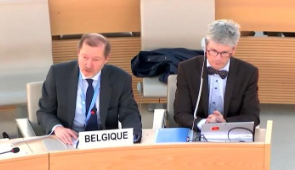 Luxembourg, Netherlands), expressed deep concern over the worsening security situation in Mali and its impact on human rights. He commended the Mali government for their commitment to cooperate with the Independent Expert's mandate but noted that Mali needs to recognise the gravity of the situation in the country. He then called upon the Mali authorities to cooperate with various UN mechanisms related to human rights in Mali. Furthermore, he expressed concern over abuses committed by armed groups and extremist terrorist organisations and the lack of implementation of recommendations from the International Commission of Inquiry. The Benelux countries urged Mali to establish sustainable reintegration and rehabilitation programs for affected children and to revise legislation on the protection of children to end such practices.
Luxembourg, Netherlands), expressed deep concern over the worsening security situation in Mali and its impact on human rights. He commended the Mali government for their commitment to cooperate with the Independent Expert's mandate but noted that Mali needs to recognise the gravity of the situation in the country. He then called upon the Mali authorities to cooperate with various UN mechanisms related to human rights in Mali. Furthermore, he expressed concern over abuses committed by armed groups and extremist terrorist organisations and the lack of implementation of recommendations from the International Commission of Inquiry. The Benelux countries urged Mali to establish sustainable reintegration and rehabilitation programs for affected children and to revise legislation on the protection of children to end such practices.
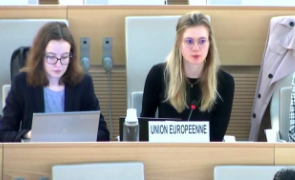 The representative of the European Union (EU) commended the Mali authorities' commitment to renewing the Expert's mandate and she acknowledged that the situation in Mali remained a cause for concern. She commended the recommendations in the report, and she emphasised the need to prioritise human rights and development for the people of Mali. The representative expressed disappointment over Mali's decision to withdraw from Sahel G5 integration and stressed the importance of regional cooperation to address the challenges in Mali and the wider region. She additionally called for an investigation into the reported human rights abuses by the Russian Wagner mercenaries. Furthermore, the representative also expressed regret over the expulsion of the director of MINUSMA’s Human Rights Division.
The representative of the European Union (EU) commended the Mali authorities' commitment to renewing the Expert's mandate and she acknowledged that the situation in Mali remained a cause for concern. She commended the recommendations in the report, and she emphasised the need to prioritise human rights and development for the people of Mali. The representative expressed disappointment over Mali's decision to withdraw from Sahel G5 integration and stressed the importance of regional cooperation to address the challenges in Mali and the wider region. She additionally called for an investigation into the reported human rights abuses by the Russian Wagner mercenaries. Furthermore, the representative also expressed regret over the expulsion of the director of MINUSMA’s Human Rights Division.
The representative of Iceland, speaking on behalf of the Nordic-Baltic countries, highlighted the systematic targeting of civilians by extremist armed groups and expressed deep concern over violations committed by national forces and foreign military companies on their behalf. The representative stressed the importance of strengthening access to justice, fighting impunity, and increasing accountability. They noted the shrinking civic space and growing pressure on freedom of expression, including attacks on human rights defenders. The expulsion of the director of the UN peacekeeping mission's Human Rights Division in Mali and the difficulties faced by the Independent Expert during their visit were worrying developments, he stated. The representative asked how the Malian authorities can improve the human rights situation in the country and how the international community can effectively address the shrinking civic space in Mali.
The representative of Cote d'Ivoire delivered a statement on behalf of the African Group; he acknowledged the complexity of the situation in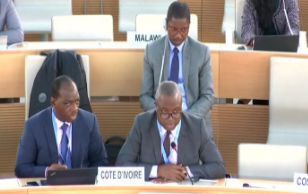 Mali, citing challenges such as terrorism, international organised crime, and climate change that create favourable conditions for human rights violations and worsening humanitarian crises. He commended the progress in protecting civilians and enhancing security and the consensus-based timeline for a return to constitutional order in cooperation with the African Union and the UN. He urged partners to support Mali in organising the forthcoming free, fair, transparent, inclusive, and credible elections to be conducted in secure conditions to maximise participation. Additionally, he emphasised the importance of the Malian government continuing to promote, protect, and ensure respect for human rights and maintaining cooperation with the council and its mechanisms.
Mali, citing challenges such as terrorism, international organised crime, and climate change that create favourable conditions for human rights violations and worsening humanitarian crises. He commended the progress in protecting civilians and enhancing security and the consensus-based timeline for a return to constitutional order in cooperation with the African Union and the UN. He urged partners to support Mali in organising the forthcoming free, fair, transparent, inclusive, and credible elections to be conducted in secure conditions to maximise participation. Additionally, he emphasised the importance of the Malian government continuing to promote, protect, and ensure respect for human rights and maintaining cooperation with the council and its mechanisms.
The representative of the United States of America welcomed the briefing and shared concerns about stability and security in Mali. He called on the transition government of Mali to protect all human rights defenders without exception. He urged them to cooperate with human rights activities, including requests for access to sites of alleged human rights violations. He expressed grave concern about the alleged involvement of the Kremlin-backed Wagner group in human rights abuses. He emphasised the need for independent experts, OHCHR, and news agencies to provide an honest and transparent accounting of Wagner's role in destabilising Mali. Furthermore, he acknowledged the United States of America’s full support to those within Mali's transition government working to restore democracy, civilian rule, and constitutional order. He stated that the United States intends to closely follow the constitutional referendum and preparations for local, legislative, and presidential elections. Finally, the representative questioned the next steps for the proposed independent investigation into possible atrocities in Mali linked to the Wagner group.
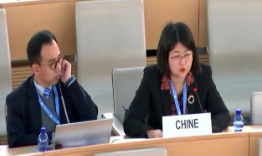 The representative of China expressed deep concern about the situation in Mali, noting that security instability affects Mali and the wider region. She reiterated China's support for Africans in solving African problems in African ways. She supported Mali in strengthening communication and coordination with regional organisations to find solutions that promote stability and development in Mali and the region. She acknowledged and supported the government's efforts to promote and protect human rights. Moreover, she emphasised the importance of respecting Mali's sovereignty, independence, and territorial integrity and providing technical assistance and capacity-building to the government based on their needs to promote and protect human rights effectively.
The representative of China expressed deep concern about the situation in Mali, noting that security instability affects Mali and the wider region. She reiterated China's support for Africans in solving African problems in African ways. She supported Mali in strengthening communication and coordination with regional organisations to find solutions that promote stability and development in Mali and the region. She acknowledged and supported the government's efforts to promote and protect human rights. Moreover, she emphasised the importance of respecting Mali's sovereignty, independence, and territorial integrity and providing technical assistance and capacity-building to the government based on their needs to promote and protect human rights effectively.
The representative of the United Kingdom expressed deep concern over the deteriorating situation in Mali and the obstruction of MINUSMA's human rights division by the Malian authorities, including the expulsion of its director, which undermines the UN's efforts to monitor, report on, and investigate human rights violations. The representative urged the authorities to facilitate unrestricted investigation access as mandated by the UN Security Council. Furthermore, she highlighted the need for accountability and justice for the massacre in Moura and welcomed the report of the independent Expert, particularly regarding statistics on sexual and gender-based violence and urged the adoption of new legislation on this issue. She additionally noted credible reports of human rights abuses committed by Russian military and security personnel as per the press statement issued by UN experts in January 2023 regarding possible war crimes and crimes against humanity committed by government forces and the Wagner group and sought an assessment from the Independent Expert.
The representative of Spain expressed deep concern about the serious violations of international humanitarian law and human rights law in Mali, committed by terrorist groups, Malian defence and security forces, and the Wagner Group against civilians. She emphasised the importance of fighting impunity, ensuring accountability for these violations, and implementing the peace and reconciliation agreement for lasting national reconciliation. The postponement of the constitutional referendum was seen as an obstacle to returning to a civilian regime according to the agreed time frame between Mali and ECOWAS. Transparent, inclusive, and credible elections were crucial for returning to constitutional law. The representative also expressed hope that new NGO regulations would not hinder the activities of these organisations. She emphasised the international community's need for technical assistance and cooperation to help establish robust mechanisms for human rights protection and promotion in Mali. The representative asked how the international community can help create a climate for credible and transparent presidential elections in Mali.
The representative of the Office of the United Nations High Commissioner for Refugees (UNHCR) appreciated the report of the Independent Expert for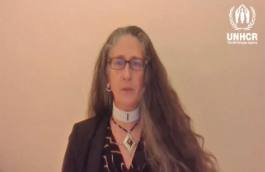 explicitly highlighting the increase in internally displaced persons (IDPs). She expressed support for the recommendations to the Malian government to strengthen sub-regional cooperation. She also invoked the call from the UN High Commissioner for Refugees to end statelessness, congratulating the Republic of Mali for achieving significant milestones, including the Action Plan to combat statelessness, pledges made at the High-Level segment on Statelessness in May 2020, and the implementation of the Law on Nationality to facilitate the naturalisation process. She expressed their commitment to collaborating with the government of Mali to facilitate the naturalisation of refugees, identify those at risk of statelessness, and prevent statelessness. The representative announced the reopening of the UNHCR office in Mali to support efforts to reduce statelessness and find durable solutions. She further expressed concern and commitment to working with the government of Mali to end the 33 years of statelessness affecting over 14,000 Mauritanians and their descendants who have been living in exile in Mali.
explicitly highlighting the increase in internally displaced persons (IDPs). She expressed support for the recommendations to the Malian government to strengthen sub-regional cooperation. She also invoked the call from the UN High Commissioner for Refugees to end statelessness, congratulating the Republic of Mali for achieving significant milestones, including the Action Plan to combat statelessness, pledges made at the High-Level segment on Statelessness in May 2020, and the implementation of the Law on Nationality to facilitate the naturalisation process. She expressed their commitment to collaborating with the government of Mali to facilitate the naturalisation of refugees, identify those at risk of statelessness, and prevent statelessness. The representative announced the reopening of the UNHCR office in Mali to support efforts to reduce statelessness and find durable solutions. She further expressed concern and commitment to working with the government of Mali to end the 33 years of statelessness affecting over 14,000 Mauritanians and their descendants who have been living in exile in Mali.
The representative of Australia expressed deep concern over the ongoing violence and instability in Mali, particularly the impact of violence on women and children. She called on the Malian authorities to strengthen the rule of law and ensure that all violations and abuses of human rights and international humanitarian law are thoroughly investigated and perpetrators brought to justice, including those committed against civilians by security forces and armed non-state groups. She urged Mali to maintain its timetable for the return to democratic elections in 2024 and create an atmosphere free of threats and intimidation for the elections. She additionally urged the adoption of legal mechanisms to protect children, combat child marriage, and eliminate the practice of female genital mutilation. The representative inquired about the progress and what can be made to reduce the disproportionate impacts of conflict on children in Mali.
The representative of the Russian Federation acknowledged Mali's efforts to stabilise its internal political situation, resolve socio-economic issues, and hold elections but noted that there are challenges with human rights, and certain terrorist groups hinder progress. The representative regretted the withdrawal of peacekeeping contingents by the UK, Germany, Sweden, and France's plans to stop financing assistance programs. Yet, many people still need food assistance in Mali. He additionally rejected allegations of abuses committed by the forces of Mali with Russian instructors, stating that all Russians are there based on bilateral agreements and focused on their allocated tasks. He further emphasised the need for the international community to continue supporting the Malian authorities within the framework of law enforcement agency development and help them overcome the adverse effects of the food and energy crisis.
The representative of France expressed concern over the difficulties he encountered during his visit in February 2023, which reflected the deteriorating situation and lack of human rights protection by the transition authorities. He commended the MINUSMA human rights division for highlighting these issues. He also expressed deep concern over serious human rights violations, including murders, rapes, attacks, theft, and cattle raids committed by terrorist groups and Russian Wagner mercenaries. The representative called on Malian authorities to protect civic space in the country, which is constantly under threat and shrinking. He also emphasised the need for an investigation in the abuses committed by authorities and Wagner Group.
Concluding Remarks
In his closing statement, the Independent Expert stated that the ongoing security crisis in Mali, which has yet to be effectively addressed since 2012, is the root cause of other problems in the country. The Expert stressed that the issue is not limited to Mali alone but has also affected other coastal countries, such as Togo, Benin, and Senegal. He called for reassessing the current national-level strategy to address the need for a regional approach to the security situation.
While acknowledging that the Malian Army has made some improvements, he stressed the need to reassess the global security strategy by examining limitations. He called for African cooperation and initiatives supported by the international community to bring lasting stability and combat terrorism in Mali.
He also emphasised the importance of cooperation and ties with other African countries, supported by the international community, to bring stability and combat terrorism in Mali. The need for coordination and local efforts in solving problems was highlighted, focusing on involving communities and development actors in finding solutions. To conclude, Mr. Tine stated that the crucial problem in Mali is to bring security and stability, as failure to do so would have regional implications.
Position of Geneva International Centre for Justice
Geneva International Centre for Justice (GICJ) is concerned about reports of continued attacks by extremist groups such as Jama’art Nasr al-Islam wa Muslimin (JNIM) and the Islamic State in the Greater Sahara (ISGS), which pose a dangerous threat to Malians and the stability of the country.
GICJ urges the international community to provide all necessary technical assistance per the Independent Expert's recommendations for restoring peace in Mali throughout its territory. Additionally, GICJ would like to remind the international community to focus on assistance tailored to meet the needs and priorities of Mali by utilising African-led solutions for African problems.
Further, we are deeply concerned about the shrinking civic space in Mali, including violations of freedom of expression and censorship of the media as well as restrictions on civil society organisations, human rights defenders, journalists, and peaceful protesters. Journalists and other media professionals have resorted to self-censorship for fear of reprisals by the Malian transitional authorities and their supporters, especially on social media.
GICJ urges the government of Mali to take immediate action to protect human rights, including ending harassment and attacks, reviewing and amending restrictive laws, fostering dialogue with civil society, ensuring access to justice, and upholding freedom of expression, association, and peaceful assembly. GICJ stands in solidarity with those affected and will continue to monitor the situation and advocate for human rights in Mali.
HRC52, UN, HRC52RegularSession, Interractive Dialogue, IndependentExpert, Mali, humanrights HumanRightsViolations, security situation, JNIM, ISGS, MINUSMA, civilian protection, Africa African Union, WestAfrica, Sahel, impunity, democratic freedoms, civil society Geneva International Centre for Justice, GICJ , Geneva4Justice , Justice
Reference
https://media.un.org/en/asset/k1a/k1a15gsfff








